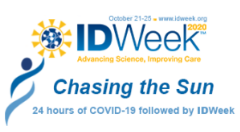
Naeemah Z. Logan, MD
Medical Epidemiologist
Division of Foodborne, Waterborne, and Environmental Diseases, Centers for Disease Control and Prevention, Atlanta, GA
Naeemah Logan, MD, is a medical epidemiologist who works with the National Antimicrobial Resistance Monitoring System (NARMS) at the Centers for Disease Control and Prevention. NARMS is a collaboration among CDC, the U.S. Department of Agriculture (USDA), and the Food and Drug Administration (FDA). This national public health surveillance system tracks changes in the antimicrobial susceptibility of certain enteric (intestinal) bacteria found in ill people (CDC), retail meats (FDA), and food animals (USDA) in the United States.
In her role, Dr. Logan investigates multistate outbreaks of human illness linked to enteric pathogens. Her work is very collaborative, and she is part of a multidisciplinary team responsible for tracking and responding to emerging antimicrobial-resistance issues among Shigella. Dr. Logan first joined CDC as an Epidemiologic Intelligence Service (EIS) Officer assigned to CDC’s Division of Global HIV and TB. Prior to EIS, she worked at a Federally Qualified Health Center in northern California, serving a predominantly migrant population.
Dr. Logan received a Bachelor of Arts degree from Cornell University. She was admitted into the university’s College Scholar program and graduated cum laude with an interdisciplinary study in Asian Studies, molecular biology, and neuroscience. She holds a medical degree from the David Geffen School of Medicine at the University of California, Los Angeles, and completed her internal medicine training at Providence Portland Medical Center. Before starting her residency training, she was a Fogarty International Global Health Research Promotion Scholar at Sahlgrenska Institute in Sweden, received a National Institutes of Health (NIH) Intramural Research Training Award, and was an NIH research scholar at Yale University.
Dr. Logan is passionate about providing quality clinical care, mentoring, and research. Her research interests include addressing health inequities, infectious disease surveillance, and molecular epidemiology.
Disclosure: Nothing to disclose

